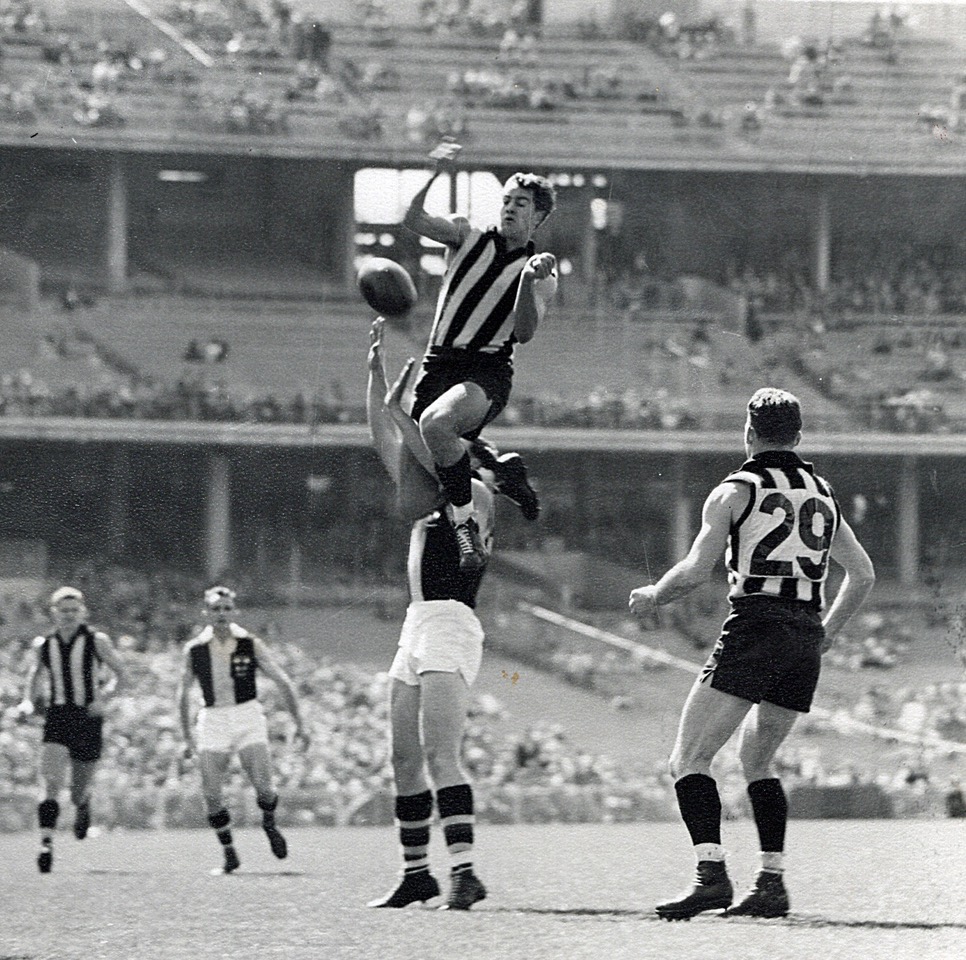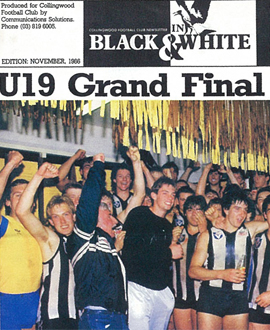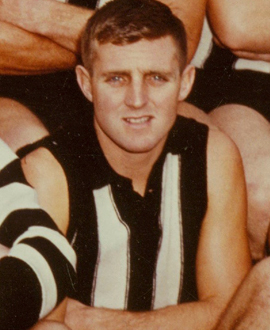For a guy who contributed as much to football as Alan Wickes has, it seems a little unfair that the thing he might be best known for was a fleeting moment of high-flying brilliance in an otherwise obscure reserves game in 1959.
But that’s the hand that fate has dealt him – and it’s one he has whole-heartedly embraced.
Wickes was a local Frankston boy who grew up playing in their footy teams. Always a naturally solid lad, by age 14 he was getting some time on the bench with Frankston under-18s. But the next two years he was part of an under-17 team that went undefeated across two seasons (and where he played alongside fellow future Magpie Peter Rosenbrock). He captained the team in the second of those seasons, 1956, and was elevated to the reserves late in the year.
By 1957 he was playing for Frankston seniors as an 18-year-old ruckman (under the tutelage of former Magpie Jack Sales, who was playing coach). He had a breakout year, winning an award for best under-21 player on the Mornington Peninsula, and being invited to Victoria Park for the 1958 pre-season. The Magpies offered him a spot on the senior list (Hawthorn had been poised to as well but the Pies jumped in ahead of them) and used three match permits to trial him in the reserves, but Frankston refused his full clearance and he returned to play out the rest of the season (under yet another former Magpie, Jack Hamilton).
By 1959, however, there was no stopping Wickes and he was cleared to Collingwood, along with Rosenbrock, in return for six Sherrin footballs! Remarkably, given he had walked into the reigning Premiers, he made his debut in just the second round of the season – against, of all teams, the fired up Melbourne side the Magpies had beaten just months before. Initially named as on the bench, he was called into the starting line-up around midday when Ray Gabelich suffered a thigh strain.
Wickes did well enough in the back pocket that day to keep his place the following week against Carlton, though he was moved to a pocket at the other end of the ground. It was symptomatic of the struggle he would face over the next few years to find and maintain a regular place. He played just 14 senior games across three seasons, but racked up a further 45 with the reserves. He was a strongly built Collingwood six-footer who perhaps wasn’t quite tall enough to cut it as a ruckman in the VFL, especially when you consider the quality of ruckmen around at that time (names such as Nicholls, Gale, Schultz and the like), but also not dominant enough in the air to be a key position player.
But he had a leap on him. And nowhere was that better demonstrated than at the MCG in September 1959.
Alan was part of the Magpie reserves team taking on St Kilda in the first semi-final. These were the days when The Herald early editions would often run a photo from the reserves game to help fill space until the senior match reports arrived in later editions. Legendary photographer Bruce Howard was on duty that day, and was perfectly positioned to grab a now famous photo of Alan soaring above Tom McKay at a boundary throw-in. Initially headlined ‘Spring in the Air’, it later appeared as ‘Second Storey Man’ when news broke that Howard’s photo had won the British ‘Picture of the Year’ award at an exhibition in London.

Unfortunately being part of a famous photo wasn’t enough to get Alan more senior games. Two years later he was back at the MCG again, and again as part of a reserves team. He was voted that team’s best player in the finals series, but that wasn’t enough to save him from the axe in what was an off-season of bloodletting. Initially he went to North Melbourne (along with Bill Serong and Mike Delanty), but while at home in Frankston was offered the opportunity to serve as playing coach. So at 22 he turned his back on the VFL and decided to focus on suburban footy.
From there, he carved out a great football life. He coached Frankston from 1962 until 1965. He then played with Seaford for a couple of seasons (and would later be named coach in their Team of the Millennium) but his playing career was ended by a serious back injury. While at Frankston, Wickes was the driving force behind the formation of the Frankston District Junior Football League. He served as president of Frankston (by this stage in the VFA) in the 1970s, and then became president of the VFA for four seasons. Thereafter he remained active in sports administration and community activities in and around Frankston. He even returned to Collingwood in the 1990s to provide help in developing a strategic plan for the club's future.
Alan Wickes spent a lifetime in football: there was much more to his service than his brief senior appearances with Collingwood. And he obviously didn’t mind being remembered for that moment in the reserves in 1959: years later, when he self-published his autobiography, he called it ‘Second Storey Man’.
- Michael Roberts



